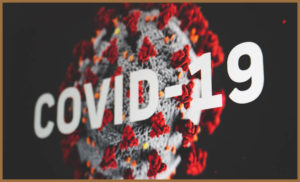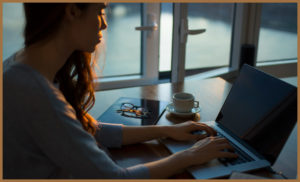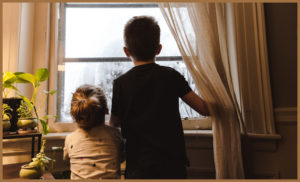As countries move into lockdown due to coronavirus, autism families are being left with less of an idea of how to support their autistic members than my local supermarket has toilet roll. The whole thing is a mess and, when all we hear is Covid-19 this or coronavirus that, this uncertainty can quickly turn to anxiety – which in turn has been proven to make you need the loo more (which, oh no, leads back to the missing toilet roll!).
But, if you’ll just clench your buttocks for one second (a phrase I never thought I would have to write on this site), there is a solution. So, as more of us start to ponder the ultimate hell (forced quality time with our families), I want to look at said solution, by creating a go-to guide for autism coronavirus support (where links to specific topics can be found by clicking the titles below).
Explaining COVID-19 to People With Autism
Supporting Autistic People During Lockdown
A Word About Autistic Students in UK Schools
What to Do If an Autistic Person Has Covid-19
[All information found in this article, needs to be considered in conjuction with the age and/or understanding of the autistic person – you’re the ones who will know them best, so you’ll need to be the judge of that!]

What REALLY is Coronavirus?
Although coronavirus feels new, it is a virus which has actually been around since 1965 and is just as old as the first Mustang (I know which one I would rather have). Covid-19, however, is a disease which is caused by the coronavirus and, due to the fact it will target airways and lungs, it is something which should be approached with caution. The symptoms of Covid-19 include:
- A cough
- A fever
- Shortness of breath
- Loss of smell
- Lack of taste (and, no, I don’t mean lack of taste like someone who chooses to wear a Christmas Jumper outside of December).
At present, there are now a fair few vaccines for Covid-19. However, being vaccinated isn’t as simple as a one and done job as, in some cases, two doses may need to be received before immunity (and, even then, protection isn’t guaranteed AND it’s still possible to carry and transmit the condition).
Furthermore, although you are likely to hear about even more vaccines becoming more widely available over the coming months, priority will always be given to those who need it most: the vulnerable and elderly. So, despite finally being handed our Excalibur to win this war against Covid-19, there are still many more battles left to fight.
Please note: As of December 30th 2020, main carers of autistic children and adults in the UK are now on the vaccine priority list. Read the facts and what this means for you here.
Of course, if you yourself do not fit into any of these priority categories, this doesn’t mean crossing your fingers is your only defence against Covid-19. In fact, over the last year, we have learnt of many surefire ways to be better protected against the virus – most of which you no doubt have had bashed over your head in recent months, yet bear repeating:
1. Wash hands regularly.
Singing 20 seconds of a song whilst scrubbing with soapy water is a great way to fight off coronavirus – with ideal examples of this including Happy Birthday (twice), the first verse of God Save the Queen or all of Mike D’s bars in Sabotage, by the Beastie Boys
2. Use sanitizer.
As Covid-19 is caused by a virus, anti-bacterial wipes are not as helpful as they might first seem. Therefore, when looking to keep this disease at bay, use chemicals that kill viruses (or use your old friend Mr Soap).
3 Avoid touching your face.
We all know how hard it is not to stroke our chins when deep in thought or how tough it can be not to pull our eyelids down and stick our tongue out when we see someone we dislike. However, touching these body parts is a quick way to get contaminated with coronavirus. So, try to be more conscious of where you put your hands over the coming weeks.
4. Social distancing.
As most governments continue to ramp up their Covid-19 plans, the go-to recommendation for avoiding infection remains to stay at least 2 2 metres away from people. This can be done by working from home, trying not to attend gatherings (both small and large) or by being autistic and subconsciously swerving any opportunity of face to face meetings.
While coronavirus can be fatal, it is usually the case that those most in danger are already vulnerable and, while autistic people usually fall into this demographic, here ‘vulnerable’ refers to those already in unstable health conditions/over 75s.
Nevertheless, Covid-19 can have an adverse impact on many of the co-occurring conditions which autistic people have, such as anxiety and O.C.D., so what can be done to help with these?

Explaining COVID-19 to People With Autism
There’s a reason why millions of people in the UK are tuning into the regular Downing Street updates at the moment and it’s not because of the steamy chemistry between Chief Medical Officer Chris Whitty and Chief Scientific Adviser Sir Patrick Vallance. Instead, like many have done in previous times of unease, society finds comfort in being kept in the loop (and autistic people are no exception).
Of course, knowing where to start when explaining Covid-19 to an autistic person can be a little tricky, which is why, when both you and the autistic person are in a calm setting (which means you yourself aren’t a big bag of nerves and we aren’t in the middle of a treasured routine), it’s best to get the ball rolling with a 3-part discussion in which you:
- Assess what is already known (and, believe me, we will already know things).
- Ground our understanding with facts
- Prepare us for what’s to come
During each step of this process, validating the autist’s opinions and experiences is especially important. However, during no time is it more crucial that when you begin and we are already feeling some slight anxiety surrounding what is happening. When this all started, I was constantly zig-zagging between denial and thoughts of impending doom, but having had someone remind me that these feelings are natural (and not trying to make me change my thoughts) was a small conversation that made a world of difference.
Once a baseline is then established, it’s time to clue us in where possible and, while you may be tempted to use this opportunity to blurt out everything you think you know, this is ill-advised, as our knowledge is currently changing so frequently. Instead, any discussion surrounding coronavirus should focus on what can be done to prevent it and how it is likely to change our routines – in particular, changes related to going to school or work.
Of course, most autistic people are averse to change, so this will inevitably cause a bit of friction. However, using in-depth social stories can make information easier to digest, especially if the story contains a lot of certainties i.e:
- What will happen
- Where we will be
- What we will see
- What we will do
- Who we will be with
For more information on preparing an autistic person for an unexpected change, check out this article

Supporting Autistic People During Lockdown
For autistic people, any kind of lockdown (whether it be national or local) means that all things resembling a previous schedule are about to go out the window. Yet, never forget that where one routine ends another can always begin. For this reason, finding a new normal is essential over the coming days and, like a phoenix rising from the ashes, it’s best that this new routine contains some traces of the old one for example:
- Sleep: when to go to bed and when to rise and shine
- Clothes worn: so even if someone isn’t going to school they can still wear their uniform to study at home
- Diet: the only time it IS okay to stockpile one specific food (fingers crossed you don’t need pasta)
- Shows watched: recording favourite shows is never a bad idea, especially when ‘breaking news’ might break into daily viewing
With that said though, while there are still many changes which are unavoidable, this doesn’t mean you should avoid any explanation of what they might be. Once again, in-depth social stories will be your friend here. However, in addition to the cold hard facts, try to elaborate on why some of the changes are taking place i.e. ‘You will see your sister at home because her university may have the germs that could make her poorly’.
Furthermore, during this time, exercise will be extremely important for physical health, destressing and tiring us out (to ensure a sleep schedule can be kept). Therefore, make sure autistic people are finding ways to stay fit; be it through online Yoga videos or by dusting off your old ‘Davina McCall: 30-day fat burner’ DVD. Remember this isn’t one of those do as I say, not as I do moments, so if we have to exercise you have to put down that Pringles tube get off the sofa and get involved.
A Word About Autistic Students in UK Schools:
At present, any child with an Education, Health and Care Plan (EHCP) can still attend school – although attendance is optional, and classes are likely to be disrupted if staff are unavailable.
Under these circumstances, it’s probably worth mentioning that my younger self would have preferred to stay at home and have support staff call/video chat. As, even though staying in school might seem best for maintaining a routine, I think going into classes and seeing all the changes with no other students would have sent me full-blown Vesuvius – not to mention that, if we do go into a lockdown, that would add another change on another change, resulting in disaster.
[Again, please use your own knowledge of the autistic person here]
What to Do If an Autistic Person Has Covid-19
Covid-19 can be caught by anyone and, despite rumours, this includes all ethnicities and ages. As such, if an autistic person demonstrates signs of a persistent cough or high fever, then no matter what you think it may or may not be, it’s time for them to join that exclusive party for one, known as self-isolation.
During self-isolation, it is crucial that a person with suspected Covid-19 remains isolated and, while you would think this next bit is obvious, this means they should avoid leaving their home until things clear up. Additionally, if someone within your household is showing signs of Covid-19, then pull up a chair bust out that book you always said you wanted to read and join in for the long haul.
Furthermore, when in self-isolation, it’s imperative that you or your loved one does not clog up emergency lines (at least for the first 7 days of showing signs). Instead, try to rely on the countless online resources such as those from the World Health Organisation, or your local government.
Pro tip: Stay on official pages at this time and avoid Dodgy Dave and his home medication recommendations such as ibuprofen – which has come under debate due to the anti-inflammatory effects which may hide the symptoms of a worsening infection.
Finally, it’s very easy to get swept away with the media at the moment. However, the picture is not quite as bleak as it can seem. Some are making their way through this condition without even realizing that they have it and, of those that do, they often see the other side of Covid-19 within the space of a fortnight.
With this in mind, remember that a positive attitude is even more contagious than coronavirus, so try to keep your chin up in the weeks ahead. Things are likely to be tough for the next few months but, if any community is strong enough to pull through this, it’s the autism community.

Carry on the Conversation
Can you suggest any activities to take up in the event of a lockdown or during self-isolation/social distancing? Let me know in the comments below. And, when you’re ready to read some news which isn’t about the coronavirus or Covid-19, why not check out my monthly autism news roundups which can be found here.
As always, I can also be found on Twitter @AutismRevised and via my email: AutisticandUnapologetic@gmail.com.
If you like what you have seen on the site today, then show your support by liking the Autistic & Unapologetic Facebook page. Also, don’t forget to sign up to the Autistic & Unapologetic newsletter (found on the sidebar on laptops and underneath if you are reading this via mobile) where I share weekly updates as well as a fascinating fact I have found throughout the week.
Thank you for reading and I will see you next week for more thoughts from across the spectrum.


